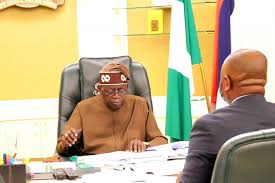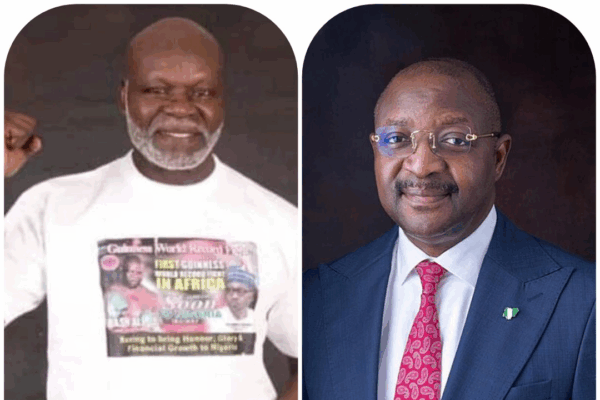The prospect of Diaspora voting in Nigeria has once again been thrust into the limelight, as the Independent National Electoral Commission (INEC) takes bold steps to implement reforms aimed at reshaping the electoral process. INEC Chairman, Prof. Mahmood Yakubu, shared these ambitious proposals during a meeting with Resident Electoral Commissioners (RECs) in Abuja, highlighting the commission’s dedication to inclusivity, efficiency, and technological advancements in Nigeria’s electoral system.
 The INEC Chairman revealed that the commission has outlined 142 recommendations in a detailed 524-page report on the 2023 general elections. These recommendations encompass various aspects of the electoral process, including voter management, technology, security, and legal frameworks.
The INEC Chairman revealed that the commission has outlined 142 recommendations in a detailed 524-page report on the 2023 general elections. These recommendations encompass various aspects of the electoral process, including voter management, technology, security, and legal frameworks.
Diaspora and Early Voting: INEC is advocating for mechanisms to allow Nigerians abroad, as well as election personnel and security agents on duty, to participate in elections.
Electoral Offences Tribunal: A proposal to establish a dedicated tribunal for electoral offences, alongside an independent agency to handle political party registration and regulation.
Bimodal Voter Accreditation System (BVAS): Suggestions to streamline voter accreditation by replacing Permanent Voter Cards (PVCs) with computer-generated slips or downloadable credentials, reducing costs and eliminating voter card-buying practices.
Voter Register Cleanup: Collaboration with the National Identity Management Commission (NIMC) and other agencies to ensure the accuracy of the voters’ register.
Enhanced Voter Education: Intensified campaigns to combat misinformation and promote greater participation by marginalized groups, including women, youth, and persons with disabilities.
Prof. Yakubu emphasised that 86 of these recommendations require administrative action by INEC, while 48 depend on collaboration with stakeholders such as civil society organizations and security agencies. Eight recommendations necessitate legislative amendments, which will soon be presented to the National Assembly.

The NIDCOM Chairman, Hon Dr. Abike Dabiri praised INEC strategic policy direction adding, “We have been engaging with INEC, and are optimistic about the presentation by INEC. The bill is presently in National Assembly sponsored by the Honourable Speaker Abass. We all look forward to the amendment of the constitution to make diaspora voting a reality.
One of the most significant announcements is the push to introduce Diaspora voting, a move that has been met with excitement from Nigerians living abroad. Ambassador Alistair Soyode, the first global Chairman of Nigerians in Diaspora Organisation (NIDO), expressed optimism about this development. “This is wonderful news for the Diaspora. We have been calling, and mobilizing with many in the Diaspora for decades to see the realisation of Diaspora voting rights,” he said.
Other stakeholders’s statements underscores the relentless advocacy efforts of Nigerians abroad, who have long championed the inclusion of Diaspora voting as a critical step toward recognizing their contributions to national development. With over 17 million Nigerians living outside the country, the potential impact of this reform on elections and governance cannot be overstated.
For Nigerians in the Diaspora, voting rights represent more than just participation in elections; it is a validation of their integral role in shaping the nation’s future. The potential inclusion of millions of Nigerians abroad in the electoral process could significantly influence policy decisions and promote accountability in governance.
Diaspora voting also aligns with global democratic practices, where citizens residing abroad are granted the right to vote in their home countries. It is a testament to Nigeria’s commitment to inclusivity and the recognition of its global citizens’ contributions.
While the path to implementing Diaspora voting is fraught with challenges, including legislative approval and logistical considerations, the optimism among stakeholders like Alistair Soyode is contagious. “This is a step in the right direction,” Soyode remarked, urging the National Assembly and all relevant bodies to prioritise this reform.
 The Chairman of Nigerians in Diaspora Europe TC, Alhaji Issa Abdullahi, added, “The Diaspora community must continue to engage with the Nigerian government, leveraging their influence and resources to ensure the realisation of this long-awaited dream. With sustained advocacy and collaboration, Diaspora voting could become a reality, marking a historic milestone in Nigeria’s democratic journey”.
The Chairman of Nigerians in Diaspora Europe TC, Alhaji Issa Abdullahi, added, “The Diaspora community must continue to engage with the Nigerian government, leveraging their influence and resources to ensure the realisation of this long-awaited dream. With sustained advocacy and collaboration, Diaspora voting could become a reality, marking a historic milestone in Nigeria’s democratic journey”.
 As Prof. Yakubu stated, “The commission will step up action on voter access and distribution to polling units,” signaling INEC’s commitment to inclusivity. It is now up to all stakeholders to rise to the occasion and ensure that every Nigerian, regardless of location, has a voice in the country’s future.
As Prof. Yakubu stated, “The commission will step up action on voter access and distribution to polling units,” signaling INEC’s commitment to inclusivity. It is now up to all stakeholders to rise to the occasion and ensure that every Nigerian, regardless of location, has a voice in the country’s future.
This transformative agenda promises to redefine Nigeria’s electoral landscape, setting the stage for a more inclusive and participatory democracy.9
—————————————————————————————————————————————
Your help to our media platform will support the delivery of the independent journalism and broadcast the world needs. Support us by making any contribution. Your donation and support allows us to be completely focus, deeply investigative and independent. It also affords us the opportunity to produce more programmes online which is a platform universally utilised.
Thank you.
Please click link to make – DONATION










